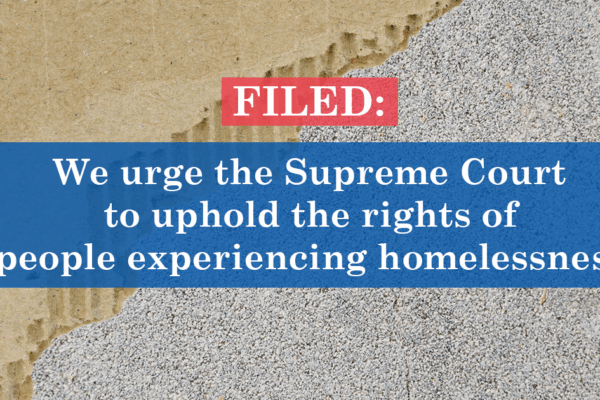The American Civil Liberties Union and ACLU affiliates in 18 states including South Carolina have submitted a friend-of-the-court brief in the U.S. Supreme Court in Grants Pass v. Johnson, arguing that the Eighth Amendment’s prohibition on cruel and unusual punishments does not allow cities to issue fines or arrest people for sleeping outside in public when they have no access to adequate shelter.
Oral arguments in Grants Pass v. Johnson are scheduled for April 22. The case involves an Oregon town that passed ordinances barring people from sleeping outside in public using a blanket, pillow, or even a cardboard sheet to lie on. Last year, the Ninth Circuit Court of Appeals ruled that criminally punishing unhoused people violates the Eighth Amendment “if there are no other public areas or appropriate shelters where those individuals can sleep.”
Our April 3 amicus brief argues that the original intent and meaning of the Eighth Amendment protects people experiencing homelessness from the cruel and unusual punishment of being arrested or fined for simply existing.
“From its adoption, the Eighth Amendment recognized that as society develops and matures, so too will its appraisal of what punishments are proportionate,” said Allen Chaney, legal director for the ACLU of South Carolina. “Especially in South Carolina, where laws heavily favor landlords at the expense of housing security, arresting folks simply for being unhoused is unmistakably cruel.”
“Instead of saddling people with fines, jail time, and criminal records that only perpetuate cycles of homelessness, cities should focus on proven solutions, like affordable housing, accessible and voluntary services, and eviction protections,” said Scout Katovich, staff attorney with the ACLU Trone Center for Justice and Equality.
At the ACLU of South Carolina, we joined in the writing of this brief in part because of our commitment to housing justice. Homelessness is a housing issue, and while we work to protect the rights of tenants via policies including Eviction Right to Counsel, we also seek to protect the rights of people who do not have a fixed residence.
The outcome of Grants Pass may have implications for South Carolina municipalities that have sought to criminalize the lives of homeless people. As we and our coalition partners wrote to the City of Columbia in 2023, the criminalization of homelessness is expensive, illegal, and ineffective at reducing homelessness.
The Eighth Amendment’s broad language prohibiting the infliction of “cruel and unusual punishments” was inspired by the English Bill of Rights, and was understood at the time of its adoption to the U.S. Constitution to embody the principle of proportionality, meaning that a punishment must be appropriately tailored to the seriousness of the offense. In Grants Pass, where the “offense” involves sleeping outside where no alternative shelter exists, any punishment, including the fines and jail time imposed by Grants Pass, is plainly disproportionate.
“When applied to people with nowhere else to go, the ordinances in this case disproportionately punish unavoidable, life-sustaining, and fundamentally human acts. Punishing the most vulnerable among us for such behavior violates the Eighth Amendment,” the brief reads.
The brief further warns that the narrow view of the Eighth Amendment pushed by Grants Pass and others in support of the city, which argues that the amendment speaks only to the method of punishment, is untethered to the original meaning and decades of Supreme Court precedent. Under the city’s argument, because hundreds of dollars of fines and 30 days in prison are not inherently cruel punishments, they are constitutional, regardless of the crime or circumstances of the person being punished. This twisted logic ignores the Eighth Amendment’s prohibition on disproportionate punishment, which the Supreme Court has used to bar making it a crime to be addicted to drugs and to ban the death penalty for children and people with intellectual disabilities, for example.
For more information about this case, see the ACLU case page for Grants Pass v. Johnson.
Stay Informed
Sign up to be the first to hear about how to take action.
By completing this form, I agree to receive occasional emails per the terms of the ACLU’s privacy statement.
By completing this form, I agree to receive occasional emails per the terms of the ACLU’s privacy statement.

